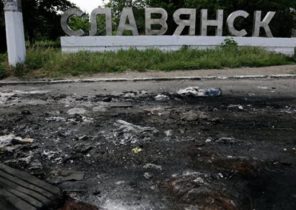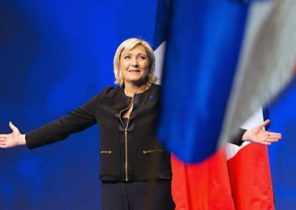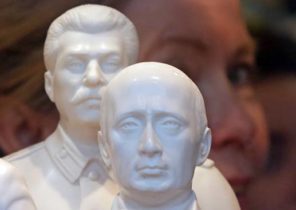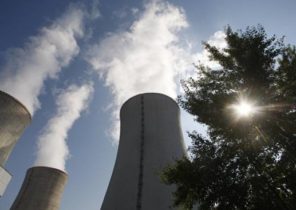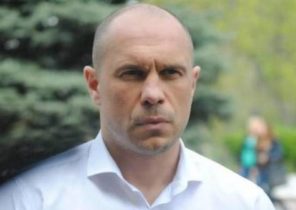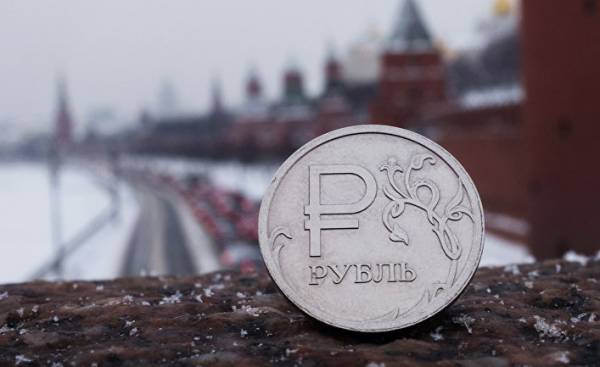
The collapse of the USSR was marked for Russia the beginning of a new time, because a significant part of the former unified country, first of all, the historical part of the “Russian world”, that is Russian civilizational, and ethnic, world, suddenly found himself up to the Russian borders. The Yeltsin decade has brought the country to collapse in many spheres, and Russia fell into economic and social the bottom.
But even then Russia possessed two characteristics of a superpower, but more be could not. We are talking about its own nuclear weapons almost similar to the US level and vast natural resource of planetary significance. This, above all, energy, precious metals, metal ores and non-metals, wood, fresh water, fertile farmland, and so on.
The case of Russia went to the mountain, of course, in the era of Vladimir Putin. There was an economic leap, and the country began to climb out of that abyss, which was at the end of Yeltsin’s rule. The constant growth, which began in fact in the period of the appointment of Putin as Prime Minister in mid-1999 and his subsequent election to the presidency, continued until 2009, when time slowed down under the impact of the global crisis. The epicenter of the crisis was Anglo-Saxon world, and the reason is the collapse of neoliberalism. The Russian economy continued to grow in subsequent years, but three years ago the process stopped, primarily because of the sanctions that Western countries imposed because of the Ukrainian crisis.
After the reduction of GDP in 2014 to 3.7% in 2015, a decline of 1.5%. And in 2016, mainly due to the rise in the last quarter, overall growth reached 1%. Looks like the economy is finally adapted to the conditions of sanctions and, to cope with certain consequences of stabilization, will continue to grow and flourish. But Russian politicians and experts continue to argue about which way to go next and what reforms to resort.
Russia has strengthened, and its army was more powerful. Progress has been made in space research, energy development. However, in the circles of economists criticise the fact that due to residual elements of neoliberalism, the country missed the time for the development of its industry in various sectors, especially in manufacturing industry. Also, Russia could use its natural resources of planetary importance, so that, on the one hand, to raise the level of processing of export production, and with another — to substitute its own production of the imported goods, so as to reduce the cost of exports and to develop some industry.
Some sectors, e.g., military and energy, partly mechanical engineering and vehicle production, are extremely well developed and show a steady growth. However, some processing industries never recovered from the turmoil of the 90-ies. Despite rehabilitation measures, these sectors have not reached the necessary dynamics and does not satisfy domestic demand, causing a need to import, and the quality of products is in need of technological breakthrough.
In 2016, during my two visits to Russia, which lasted a total of a month, when I traveled extensive European Russia (Volga-Vyatka region, Central economic region, North-West region and most of the Volga region) and visited research centers, I was able to personally see the real power of the Russian state. I mean the impressive planning and organisation of the Russian cities in all the aforesaid regions, the rise and diversity of agriculture, the strength and effectiveness of all types of communications, the excellent functioning of the scientific sector. At the same time, notice in my life, I had the opportunity to visit and learn most of the other European countries, and I have something to compare.
The standard of living of the population is slightly higher than the Serbian, but he’s actually declined in recent years due to the above mentioned sanctions that Western countries imposed due to the Ukrainian conflict. Nevertheless, the state more or less maintains the purchasing power of the population, while on the other hand, there is a reduction of wages in terms of euros, in foreign currency. So if we translate the size of a modern salaries in foreign currency, they are much less than it was three years ago. But the money’s purchasing power in Russia decreased slightly.
At the faculty of Economics in Nizhny Novgorod, where I had the opportunity to read lectures to students and to establish contacts with colleagues, are well aware of the successes and failures and the opportunities that have countries to build on existing strengths, especially in the field of natural resources. Also they understand well and the real challenges and contradictions existing in the country and are mainly a legacy of the 90-ies, the deep crisis and damage, which not only hit the economy, but also led to greater social differences. They subsequently, of course, somewhat leveled. For example, in the period after 2000, the most significant results were achieved on the level of the lowest social classes who were in the most difficult situation, therefore, the demographic situation in the country was extremely difficult: experienced negative natural growth.
In this direction government — and in this I could see — has achieved great success, which is obvious, and which, of course, contribute to the fact that the government can count on the support of the greater part of the electorate, because the General population mainly not have to worry about basic survival. For example, public transport in Nizhny Novgorod (bus, trolleybus, tram, minibus, and ambulance is a small bus with big wheels) is worth about 20 rubles, or 30 to 35 dinars. In Belgrade the cost is much higher. Lunch (the menu, incidentally, is very diverse) at the student Union at the faculty of Economics in the Department in Nizhny Novgorod branch in knyaginino (students and faculty eat in the same canteens) worth the equivalent of around one Euro. Also very affordable accommodation in student hostels, sports and cultural life, and prices in the palaces of sports and cultural establishments are very accessible.
Under Putin, for each newborn child the family receives about 10 thousand euros. By the way, this is one of the reasons that the demographic situation in Russia has stabilized, and over the past decade, natural population growth is negative is zero, that is, without population loss and then a positive. And this is a huge success and today a rarity among Caucasoid peoples. They are all in Europe and in Anglo-America, and Australia are faced with demographic decline and, most importantly, with more or less pronounced negative natural increase.
Everything in Russia is connected with the state, powerful and impressive: starting with trains that travel at a speed of 150 kilometers per hour (in strategic areas, such as Moscow-St. Petersburg) and even faster, a very extensive network of airports, uniquely developed internal communication by rivers and canals (on a cruise ship I traveled to the Northern and middle course of the Volga), and up to the monumental architecture (the millennial heritage) cities in the many regions where I visited. Also impressive is the device of urban infrastructure, a satisfactory level of agriculture in the area where I visited, including Northern regions with extensive areas occupied by greenhouses, and exceptional level of supply of the Russian market all sorts of goods.
Impressive and several of the stadiums built for the world championship, I had the opportunity to visit (Moscow, Kazan, Nizhny Novgorod). And in 2018, the world will be able to see them, and the prosperity of the modern blocks in the above-mentioned and many other cities of the country. But according to the media the significance of the world Cup equivalent of the winter Olympic games in Sochi 2014.
On the other hand, in the circles of economists (I am a regular member of the editorial Board of the scientific journal “Vestnik” of the faculty of economic in Nizhny Novgorod, where he published several articles on the economy, and geopolitics and political theory, published in Russian scientific journals), there is no consensus on the future direction of development of the Russian economy.
Abroad is a great response to the position of the leading Russian economists, as expressed primarily in the speeches and publications of Sergei Glazyev. Glazyev, a respected Russian economist and adviser to President Putin, said that despite all the gains made in Russia, it is necessary to move resolutely in the already given direction, since the rest of the world is faced with a lack of clear alternatives (conceptual and practical) since 2008 and the collapse of neoliberalism.
Eyes rightly notes that the residual neoliberal and especially neomonetarist dogma inherent in the financial circles of Russia and, above all, those who are close to the Central Bank. Glazyev believes that, despite the benefits of an open economic system of the country can have and has in the global economy, for the benefit of Russia should strive for the gradual creation of a separate economic space. It would be resistant to the effects of the global financial octopus, which is actually managed by Anglo-Saxon capital and centers of power (wall Street, the city, and others).
Otherwise, the country and its economy — we are in some way witnesses to this — very vulnerable. “On the financial front, the United States possesses an overwhelming advantage. They control the emission of the world currency and the IMF, which, in turn, determines the rules of functioning of the world and most national foreign exchange markets, including Russia. Together with their geopolitical allies: Japan, the UK and the EU, the currencies of which also have the status of the world, they control the bulk of the global monetary space and have the majority of votes in international financial institutions.
On the information front global monopoly of American media allows them to shape public opinion and influence thus on voters ‘ preferences, shaping the political landscape in most democratic countries. And on other critical fronts of hybrid war: a cultural, ideological, food, energy, communications — the United States has a considerable advantage.”
With this in mind, the eye concludes that the current concept of CBR is inadequate and must be replaced by the concept of strategic and planned actions modified and adapted for the Russian Federation on the example of the successful today of the Chinese economy, especially taking into account the interests of wide layers of the Russian population.
It is essential to develop a new technological order, to abandon the current floating exchange rate of the ruble, protect and develop domestic production, especially in the processing industry. The eye indicates the oligarchic-bureaucratic part of the Russian state apparatus, the economic sector and society, which pursues its own interests, often contradicting the necessary reforms in the economic and especially the financial sector of the country. Eyes, and with it a number of authoritative Russian experts on macroeconomics and Finance, believes that it is required to reduce the too high interest rate of the Central Bank of Russia and to ensure that beneficial to the economy loans, that is, the presence of “other means”. This Glazyev in an interview with the Belgrade publication “Geopolitics” in April 2016, said:
“After the coup, the fifth of October 2000, a perfect model of Western color revolutions that the interest rate in Serbia is constantly very high, so many companies are unable to Finance their production, and some of those who took out expensive loans, tightened around his neck noose of debt. But if Serbia after 2000, the West has imposed market fundamentalism, why Russia in some elements of economic policy follows IMF recommendations, although it has enough funds and resources to defend your economic sovereignty?”
Glazyev also noted that the famous economic boom in Western countries and Japan after 1945 made possible the financing of strategic sectors of the economy within the framework of cooperation of Central and commercial banks, while not excellent, the Marshall plan and so on.
Finally, it is possible to name the basic directions of necessary reforms and improvements of the economic system of Russia, which would be her alternative. The picture is not black and white, because, according to some critics, the Putin era, Russia has managed to achieve very modest results. Some apologists, however, believe that under the pressure of domestic and international problems to change or modify nothing.
On the one hand, Russia has halted the decline that began under Yeltsin, has significantly increased its economic level (this is felt by the broad masses of the population). Demographic curves stopped the rapid decline and showed positive growth. Glaring social disparities comes from the 90-ies a bit smoothed over and corrected. However, the stratum of oligarchs that emerged in the 90 years, albeit having lost part of its influence remains strong. And a certain part of the elite society because of their own interests does not show the proper zeal in geopolitical conflict with the globalist forces, primarily the USA and Anglo-Saxon politics (Dugin calls this phenomenon the sixth column). In the financial sector are still strong position of neo-liberal and neomonetarist concept.
A significant number of Russian economic experts believes that the need to reduce imports (that seems very logical and in the interests of the country that should be the goal, giving additional impetus to the development of the domestic industry, especially in processing industry). Nominally the Russian export considerably exceeds import, which is associated with the export of energy and other comparative advantage. However, for example, in the field of agriculture and of consumer goods, household appliances, computer and information technology, the share of imports is large, and it could be lowered by stimulating its own massive and technologically high-quality production. Through these and other measures in the future can achieve significant financial benefits.
Abandoning the obsolete items neomonetarist — which implies the reduction of the interest rate of the Central Bank, the abandonment of the floating exchange rate, inflation targeting, countering of import lobby, etc — would go to the appropriate fiscal-monetary policy that is adapted to Russian conditions the neo-Keynesian economic and social doctrine.
In managing the economy and the country would cost more to build on the intellectual and expert elite to limit the influence of oligarchs and bureaucratic political structures, which in its activities is guided, first and foremost, not the interests of the state (conflict of interest). Also in the new conditions the country and its economy needs high-quality knowledge and strategy.
Need to take new institutional arrangements to adequately reduce the huge property gap formed in 90-e years, and to stabilize the situation in the interests of wide layers of the population, and the state. Of course, this is all very complex and sensitive processes and issues, as in the case of a too drastic action, large capital began to “escape” from the country, and the magnates often stimulate that they lived in the West and did not invest a significant portion of capital in the economy of their country.
In General, over the last decade and a half much has been achieved. However, due to the serious international challenges and influences faced by Russia as a world power, but also because of the very pronounced impact of the events of the 90’s, which affected all spheres of public life and the economy needs a new reform and the next steps in economic and social ways of the country. Although in circles of the Russian experts and the elite, but also among politicians there is no consensus on all elements and strategies on this long path, still there is a common understanding of the need for change.
Given all this, and important information for me personally there is still a dilemma, although the main directions of further reform actions in the economic and especially in financial sphere of Russia I have no doubt. Soon I will again travel to Russia for the next 20 days to give lectures at the faculty and also take part in several important international events in Moscow, Nizhny Novgorod, Kazan and some other cities of Russia. There, on the spot, I want in contact with the Russian scientific community to enhance their knowledge and understanding in this matter.
One thing is clear: Russia is a great world power, experiencing the rise. Its elite in General realize the path that they walked (disasters and crises of the 90s, the success of some of the mistakes of the last two decades), and serious and varied problems facing the country currently. Wherever I have been talking with the Russian in the street, I met a friendly attitude towards the Serbs — Slavic kinship, Orthodox Balkan and friendly people.
As for the elites, the attitude was different. University professors, experts were open to cooperation without rivalry, and showed kindness up to naivete. In General, the experience of communication with representatives of the state apparatus, employees of the administration and officials were also not negative, and they all spoke about the Serbs let not big, but noticeable sympathy. Russian patriotism is at the highest level: as and other holidays people wear with pride St. George’s ribbons, toast for the bright future.
For Russia, for the Motherland, which, regardless of social status and political preferences are all considered great power and are proud of it. I saw not only Russian, but also people of other nationalities: Tatars, Bashkirs, Chuvash and common people and the elite glorified the Homeland and wore St. George’s ribbons, considering themselves descendants of the participants of the great Patriotic war and emphasizing it in a conversation, proud of it. By the way, it seems that all over Russia the Russians (80% of the total population of the Russian Federation according to the census) and other national groups, like their ancestors, are ready to bring such a sacrifice now and in the future, including, renouncing material goods because they believe in the prospects and the way in which the country is going, and understand the challenges confronting!
For all of them, further economic development and reform in the country — only one of the possibilities to preserve and multiply in new conditions the strength of the country and the results that have been achieved in all spheres of life of society over the past two decades.
Scientific papers that I have with my distinguished colleagues, also professors from Serbia to Russia, published to the present, and that devoted to deepening cooperation between our countries (Serbia, Danube and Volga-Vyatka area) in the field of crop and livestock production, Russian experts and economic circles have taken with great attention and cordiality. The space for deepening economic cooperation between the two countries (in other industries too) is still covered only to a small extent and potentially huge.
